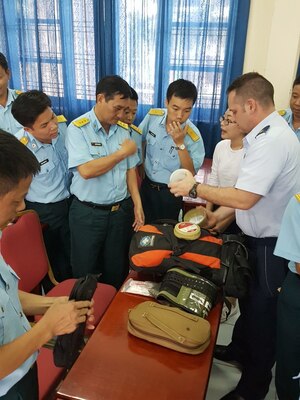By Air Force 1st Lt. Kellie Rizer Pacific Air Forces
TAM KY, Vietnam, Sept. 12, 2017 — American and Vietnamese
military members, along with several nongovernmental organizations, recently
came together in Vietnam to attend seminars lead by subject matter experts who
shared their knowledge on medical expertise and humanitarian assistance.
The Vietnam seminars are part of Operation Pacific Angel
17-2, also known as PACANGEL, which itself is one of a series of recurring
civil-military missions hosted by U.S. Pacific Command consisting of
humanitarian assistance and disaster relief activities, including medical
health services outreach, engineering assistance programs and subject matter
expert exchanges.
Held in Vietnam from Sept. 10-18, U.S. and Vietnamese
military members have the opportunity to work in partnership with local
nongovernmental organizations providing humanitarian assistance to the
residents of Vietnam’s Tam Ky in Quang Nam province.
While the health services and civil engineering programs
portion of the PACANGEL mission prepared to begin on Sept. 10, the U.S. subject
matter experts kicked off information exchanges with their Vietnamese
counterparts the week prior.
Variety of Medical Topics
The exchanges took place at medical facilities in Tam Ky and
the Vietnam Air Defense Air Force Search and Rescue Center in Hanoi, and
covered a variety of medical specialties including control and prevention of
vector-borne diseases, emergency maternal and fetal care, medical aspects of
water survival and management of metabolic syndromes.
Army Maj. Lewis Long, director of bio surveillance and
entomology with Public Health Command Pacific at Camp Zama, Japan, worked with
his Vietnamese counterparts, vector-borne disease control professionals, to
capture and test local mosquitoes for the presence of malaria, dengue fever and
other mosquito-spread diseases and pathogens.
“We demonstrated how the U.S. military conducts mosquito
surveillance and methods for collecting mosquitoes for testing of
mosquito-borne diseases, such as dengue [fever],” Long said. “By focusing our
training on the mosquito and not a specific pathogen or disease, we can do a
better job controlling everything from dengue [fever] to Zika to other related
viruses found worldwide.”
Vietnamese participants also emphasized the importance of
the exchange’s topic and expressed their appreciation for the opportunity to
collaborate with their U.S. counterparts.
“I’m an officer, but also a doctor,” said Lt Col Nguyên Thề
Nghĩa, deputy chief of Internal Medicine at the Aviation Medical Institute. “My
focus is in infectious diseases and there’s [currently] an outbreak of dengue
fever in Vietnam, so this topic is quite important and has provided useful
information to apply to my practice. I hope that this program can continue to
develop a good friendship with the U.S. and help improve care facilities in
both Vietnam and in the [Army] healthcare system.”
The close partnerships and collaboration shared throughout
the exchange provided invaluable educational opportunities for both the U.S.
and Vietnamese participants to work toward better control programs and,
ultimately, the overall reduction of human suffering.
“Sharing this training builds capacity within both the U.S.
and Vietnamese communities in how we handle vector-borne disease surveillance,”
Long said. “Partnering and collaborating with our Vietnamese partners to
understand how they deal with vector-borne disease at the local level, and
within the military, helps strengthen our connection to the community and how
we provide public health.”
Air Force Maj. Christopher Meinhart, medical director of the
women’s health clinic and obstetrician gynecologist with the 35th Medical Group
at Misawa Air Base, Japan, explained how the use of a realistic labor and
delivery simulator during his exchange on emergency maternal and fetal care
provided beneficial hands-on training to address labor and delivery issues
found in both the U.S and abroad.
“The [labor and delivery] complications that we see in the
U.S. and within the military health system are the same complications that they
see here,” Meinhart said. “Combining teaching techniques through lectures,
teamwork activities and adding in the realism of the simulator has shown to
lead to the most improvement in the neonatal and maternal outcomes.”
Many Participants
Many participants traveled from the far edges of Quang Nam
province, as far as 90 miles to Tam Ky, to attend the symposium focused on
techniques for managing complicated labor and deliveries. Meinhart described
the personal benefits he received through his participation in the symposium.
“Beyond the scope of my day-to-day practice and daily
interaction with my own patients, it’s rewarding to work with other practitioners
and impart some of the skill and knowledge I’ve gained over the years,”
Meinhart explained. “It’s been both a humbling and fulfilling experience.”
PACANGELs have built positive relations through interactions
such as these for the last decade in Bangladesh, Cambodia, Timor-Leste,
Indonesia, Vietnam, the Philippines, Sri Lanka, Thailand, Mongolia, Laos,
Tonga, Nepal and Papua New Guinea.









No comments:
Post a Comment